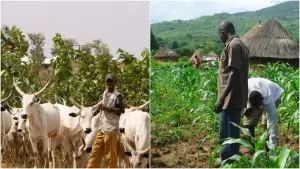Benue State Governor, Rev. Fr. Hyacinth Alia, has categorically stated that the ongoing violence and mass killings across parts of the state should no longer be classified as farmer-herder conflicts but recognized as deliberate acts of terrorism targeting farming communities.
Speaking during an interview on Channels Television's Politics Today on Friday night, Governor Alia emphasized that the scale, frequency, and coordination of these attacks point to a more sinister agenda beyond traditional agrarian disputes.
"What we are facing in Benue is not just herders and farmers clashing. This is terrorism. We are talking about bandits, specialized killers," Alia stated firmly during the interview.
Pattern of Coordinated Violence
The governor detailed several horrific incidents that demonstrate the calculated nature of these assaults. In one local government area, 73 people were slaughtered in a single night, while another attack claimed 33 lives elsewhere in the state.
Particularly disturbing was his account of a gruesome ambush in Mbalom, Gwer East, where more than 30 victims had to be buried in a mass grave following an attack that was strategically timed just after a Sunday church service.
"These are guerrilla-style operations. They wait for people to return from church, then strike. They are strategic and intentional. This is not random violence. It's coordinated and persistent."
The governor's characterization of these attacks as terrorism rather than communal clashes represents a significant shift in how the Benue crisis is being framed by state authorities. This reclassification could potentially influence security responses and policy approaches to addressing the violence.
Security Implications
By labeling these attacks as terrorism, Governor Alia appears to be calling for a more robust security response that goes beyond mediation efforts typically employed for farmer-herder conflicts. The strategic nature of the attacks, as described by the governor, suggests that conventional peacekeeping approaches may be insufficient.
The situation in Benue continues to raise concerns about the safety of rural communities and the ability of security forces to protect vulnerable populations in Nigeria's Middle Belt region, which has long been a flashpoint for violence.
As the state government works to address this security crisis, residents remain on high alert, with many communities living in fear of the next potential attack.
Follow BenriNews on social media for more updates:













